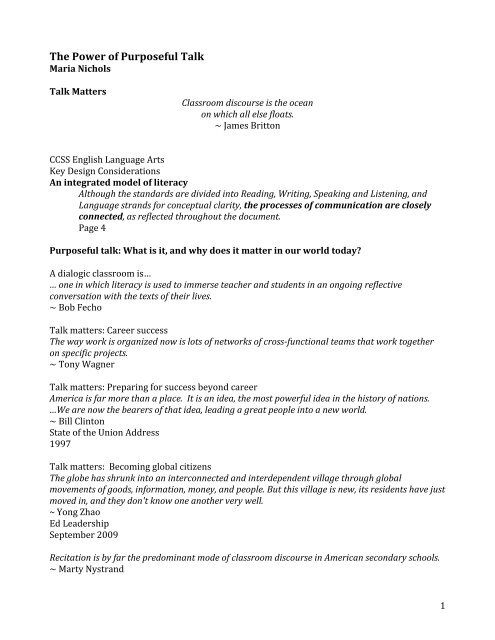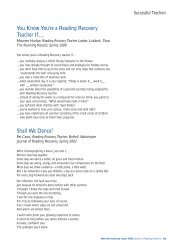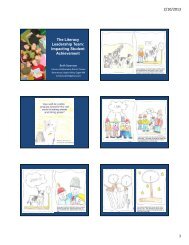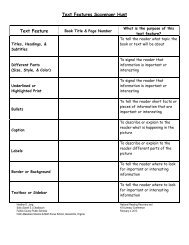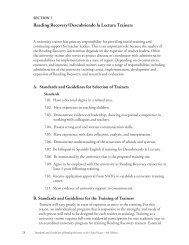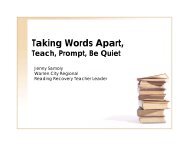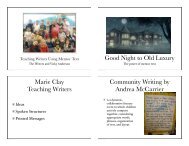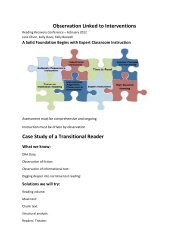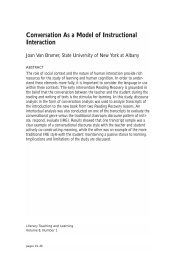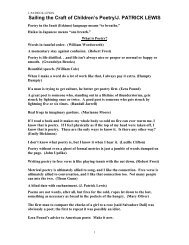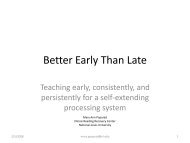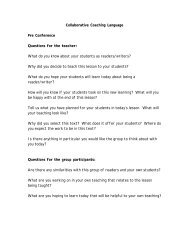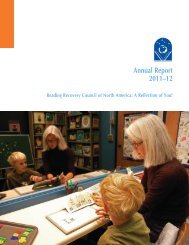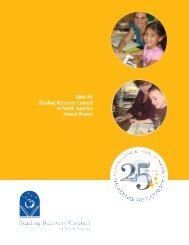Nichols, Maria – Featured Session: The Power of Purposeful Talk
Nichols, Maria – Featured Session: The Power of Purposeful Talk
Nichols, Maria – Featured Session: The Power of Purposeful Talk
You also want an ePaper? Increase the reach of your titles
YUMPU automatically turns print PDFs into web optimized ePapers that Google loves.
<strong>The</strong> <strong>Power</strong> <strong>of</strong> <strong>Purposeful</strong> <strong>Talk</strong> <br />
<strong>Maria</strong> <strong>Nichols</strong> <br />
<strong>Talk</strong> Matters <br />
Classroom discourse is the ocean <br />
on which all else floats. <br />
~ James Britton <br />
CCSS English Language Arts <br />
Key Design Considerations <br />
An integrated model <strong>of</strong> literacy <br />
Although the standards are divided into Reading, Writing, Speaking and Listening, and <br />
Language strands for conceptual clarity, the processes <strong>of</strong> communication are closely <br />
connected, as reflected throughout the document. <br />
Page 4 <br />
<strong>Purposeful</strong> talk: What is it, and why does it matter in our world today? <br />
A dialogic classroom is… <br />
… one in which literacy is used to immerse teacher and students in an ongoing reflective <br />
conversation with the texts <strong>of</strong> their lives. <br />
~ Bob Fecho <br />
<strong>Talk</strong> matters: Career success <br />
<strong>The</strong> way work is organized now is lots <strong>of</strong> networks <strong>of</strong> cross-‐functional teams that work together <br />
on specific projects. <br />
~ Tony Wagner <br />
<strong>Talk</strong> matters: Preparing for success beyond career <br />
America is far more than a place. It is an idea, the most powerful idea in the history <strong>of</strong> nations. <br />
…We are now the bearers <strong>of</strong> that idea, leading a great people into a new world. <br />
~ Bill Clinton <br />
State <strong>of</strong> the Union Address <br />
1997 <br />
<strong>Talk</strong> matters: Becoming global citizens <br />
<strong>The</strong> globe has shrunk into an interconnected and interdependent village through global <br />
movements <strong>of</strong> goods, information, money, and people. But this village is new, its residents have just <br />
moved in, and they don't know one another very well. <br />
~ Yong Zhao <br />
Ed Leadership <br />
September 2009 <br />
Recitation is by far the predominant mode <strong>of</strong> classroom discourse in American secondary schools. <br />
~ Marty Nystrand <br />
<br />
1
<strong>The</strong> I.R.E. pattern <strong>of</strong> discourse <br />
• In the IRE, a teacher initiation (I) is followed by a student reply (R), followed by an <br />
evaluation <strong>of</strong> this reply (E) by the teacher (Mehan, 1979; Cazden, 1988) <br />
• <strong>The</strong> IRE pattern was actually "the most common pattern <strong>of</strong> classroom discourse at all <br />
grade levels" (Cazden 1988:29). <br />
•<br />
School knowledge is the knowledge which someone else presents to us. We partly grasp it, enough <br />
to answer the teacher's questions, to do exercises, or to answer examination questions, but it <br />
remains someone else's knowledge, not ours. <br />
~ Douglas Barnes <br />
But dialogue … is a coming to an intellectual exchange willing to see and hear something new in <br />
the exchange, and actually creating a newer, stronger understanding… <br />
~ David Bohm <br />
A dialogic classroom is… <br />
… one in which there are lots <strong>of</strong> open questions and extended exchanges among students. <strong>The</strong>se <br />
are not classrooms based on the delivery <strong>of</strong> facts. <br />
~ Peter Johnston <br />
“From Exploratory <strong>Talk</strong> to Critical Conversations” <br />
by Kathryn M. Pierce and Carol Gilles in Exploring <strong>Talk</strong> in School <br />
• Social talk <br />
• Exploratory talk <br />
• Presentational talk <br />
• Meta-‐talk <br />
• Critical talk <br />
CCSS Speaking and Listening Standards <br />
Comprehension and Collaboration <br />
Presentation <strong>of</strong> Knowledge and Ideas <br />
Key Points <br />
• An important focus <strong>of</strong> the speaking and listening standards is academic discussion in <br />
one-‐on-‐one, small group, and whole class settings. Formal presentations are one <br />
important way such talk occurs, but so is the more informal discussion that takes place <br />
as students collaborate to answer questions, build understanding, and solve problems. <br />
Getting purposeful talk started: Creating space and support for exploratory and critical <br />
talk <br />
Conversational behavior <br />
• Hearing all voices <br />
• Growing ideas <br />
<br />
2
• Say something meaningful <br />
• Listen with intent <br />
• Keep lines <strong>of</strong> thinking alive <br />
• Negotiating meaning <br />
Creating dialogic learning environments: strategies to grow exploratory and critical talk <br />
Growing talk <br />
• Teacher as facilitator (IRE à dialogic) <br />
• <strong>The</strong> power <strong>of</strong> compelling ideas <br />
You don’t write down for children. <br />
You write up. <br />
~ E. B. White <br />
• Moving the thinking and talking from the text to the world <br />
How can we extend the imagination it takes to live inside a book <strong>–</strong> the ability <br />
to make meaning and build the world <strong>of</strong> the story <strong>–</strong> to a social imagination, <br />
a belief that we can make lives better and more just for people? <br />
~Randy and Katherine Bomer <br />
• Wrestling with controversy <br />
For intellectual engagement, the most powerful lever comes when children <br />
disagree and take each other seriously. <br />
~ Peter Johnston <br />
• Dwelling in shades <strong>of</strong> grey <br />
• Emphasizing strategic efforts <br />
Dialogue changes the epistemology <strong>of</strong> the classroom <strong>–</strong> what counts as knowledge. <br />
~ Marty Nystrand <br />
<strong>The</strong> power <strong>of</strong> purposeful talk: Developing collaborative abilities and critical habits <strong>of</strong> <br />
mind <br />
…these children and their peers are learning to participate in a strong democracy. <strong>The</strong>y expect to <br />
engage, to disagree, and to grow from that disagreement. At some point, they will vote, but that <br />
will be after they have understood their own and each other’s views and have expanded their <br />
collective mind in the process. Even if they vote self-‐interest, it will be enlightened self-‐interest. <br />
~Peter Johnson <br />
Pr<strong>of</strong>essional texts cited: <br />
Barnes, Douglas. From Communication to Curriculum. <br />
Bohm, David. On <strong>Talk</strong>. <br />
Britton, James. <strong>Talk</strong>ing to Learn <br />
Cazdon, Courtney. Classroom Discourse. <br />
Hall, Kathy. Literacy and Schooling: Towards Renewal in Primary Education Policy <br />
<br />
3
Johnston, Peter. Opening Minds <br />
Lattimer, Heather. “Gaining perspective: Recognizing the processes by which students <br />
come to understand and respect alternative viewpoints” <br />
April 2009 https://sites.google.com/site/hlattimerusd/ <br />
Mercer, Neil and Hodgkinson, Steve. Exploring <strong>Talk</strong> in School <br />
<strong>Nichols</strong>, <strong>Maria</strong>. Comprehension Through Conversation. <br />
Expanding Comprehension through Multigenre Text Sets <br />
Nystrand, Marty. Opening Dialogue. <br />
Wagner, Tony. <strong>The</strong> Global Achievement Gap <br />
<br />
4


